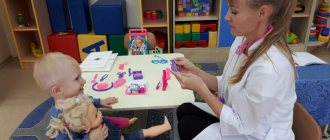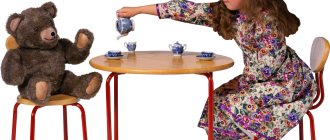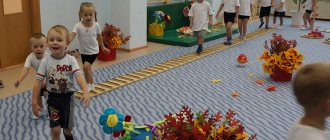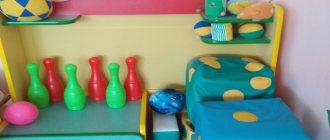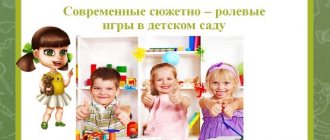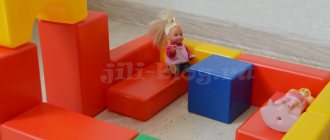How quickly our children grow up! It seems like just yesterday the baby was struggling to hold a rattle in his little hands and watched with interest the movement of the mobile, but today he is already putting his doll to bed, funny copying your words and intonations. This means that the time has come for role-playing games. Their importance in the development of children is very great. They teach you to evaluate actions, recognize yourself as part of a team, and quickly learn the rules of behavior. Read about what types of role-playing games there are and what significance they have for preschoolers in our article.
Types of role-playing games
When talking about story-based games, many people only think of “mother-daughter games” or “war games.” These are indeed some of the most common entertainments, but they are far from the only ones. Children's imagination is capable of simulating hundreds of variants of unique “theatrical performances”, where everyone can try on the role they like and convey its peculiarity and character. There are a lot of story-based games; they can be divided into several groups: staged, social, everyday, patriotic and based on the plots of literary works. Let's take a closer look at each type.
Staged
In such games, the child himself comes up with a scenario and, as a rule, speaks for all participants in the production. The basis is taken from fairy tales, cartoons or real life situations. Children teach dolls to act in accordance with the role assigned to them, endowing them with imaginary characters. The production type can be described in one phrase - “You are your own director.”
Public
This type of entertainment reflects people's work activities. For these fun topics, the themes are taken from the surrounding life and are based on the knowledge that the child has managed to acquire. Hospital, kindergarten, school, post office, hairdresser, circus, theater, house construction, police, firefighters - the list goes on and on. To become full-fledged, such classes require special “props”: thematic kits for a doctor, policeman or fireman, tools for creating hairstyles, cubes for constructing structures.
Household
Kids love to play family. They happily babysit, raise “children,” and organize holidays and birthdays. Often during the game, through dolls, children express what worries or worries them, and show relationships in their family. Take a closer look and listen to what the child says and what emotions he experiences. Maybe it's time to adjust your behavior and remove negative aspects from communication with others. After all, it turns out that the “unreasonable” child understands everything and is very worried.
Patriotic
It's hard to find a boy who wouldn't love to play war and feel like a hero fighting enemies. Such fun is necessary for the development of masculine character traits, familiarization with the concepts of “honor”, “duty”, “conscience”, “fatherland”. Of course, for entertainment of this kind you will need a whole arsenal of weapons: from medieval swords to modern blasters. The more diverse the weapons are, the more scenarios can be offered to the little defenders of the humiliated and insulted. They will be able to become epic heroes and fight against “filthy monsters,” brave scouts, fearless soldiers from the Second World War, or liberators of an unknown planet captured by evil monsters.
Based on literary stories
In these games, children live out entire episodes from read fairy tales, movies or favorite cartoons. They imitate the heroes and try on the characters' characters for themselves. The Wolf and the Hare, ninja turtles, fairy-tale princesses and courageous liberating warriors - thanks to children's imagination, they easily move from the pages of books, TV screens, theater stages to apartments and become characters in role-playing performances.
Kindergarten teachers often use didactic games, offering preschoolers types of stories that include elements of teaching the rules of behavior in society. Such activities allow you to quickly assimilate social relationships characteristic of the adult world and develop the correct reaction to various situations. Eg:
- After playing in the hospital, children will no longer be afraid of doctors. Make-believe classes at school will give you an idea of the interaction between teacher and student, rules of conduct in class, and will help you overcome your fear of the teacher.
- A game that takes place in a cafe will teach you how to behave properly at the table. This entertainment will also give you knowledge of how to beautifully set a table and use unfamiliar utensils.
- When buying goods in a makeshift supermarket, kids will be able to do this in a real store, and will also understand what the profession of a seller is and learn the names of many products.
- It is easier to learn the rules of behavior on the street, get acquainted with traffic lights in a playful way, dividing the roles of the traffic police inspector and pedestrians between children of the older group.
The socialization of children is an important task that can be easily solved with the help of play activities, but their influence on the child is much deeper. You can get acquainted with toys based on fairy tales in more detail in the corresponding section of the site.
The meaning of role-playing games
Regardless of what types of role-playing games your child prefers, they will help him prepare for the transition to a higher stage of development. This kind of fun not only captivates and entertains, it:
- They teach you to follow the rules. It is difficult for children to do what they don’t want to do. The desire to follow the rules will not appear on its own. Role-playing games will teach you this, because their essence lies in observing norms of behavior. By mastering the lives of adults, children begin to understand their moral principles, motivation and goals of activity. In addition, children develop a positive attitude towards people’s lives, their actions, and the rules of behavior in society.
- They form emotions. The child distinguishes fantasy from reality, this is confirmed by his words “pretend”, “really”, “as if”, but this does not prevent him from experiencing real emotions. Play activities reveal and shape children's feelings. Imagining herself as the mother of a “little child”, who is represented by a doll, the girl does not just repeat certain manipulations after her parents, but truly loves him. When a child acts as a hero who has completed an important task, he feels a sense of pride and responsibility for the task assigned. These experiences leave a deep imprint on the mind and shape the child’s emotional world.
- Develop intelligence. In the process of play activities, children of preschool age awaken interest in life events, professional activities of adults, and favorite heroes appear, whom they strive to imitate. Often the fun is not limited to one day, it is repeated several times. At the same time, the plot acquires new details and details. Thanks to this, children's thinking becomes purposeful and moves to a higher level of development.
- Train your imagination. Any children's game involves improvisation. The pre-conceived plot is filled with unpredictable twists: a captured enemy spy turns out to be “one of our own,” polar bears in the Arctic are eager to eat, and a princess getting ready for a ball urgently needs to put on makeup. The development of imagination affects the inclusion in the process of combinations from various life situations, elements from fairy tales or theatrical productions.
- Expand vocabulary. There is a two-way connection between speech and play. On the one hand, entertainment develops and activates speech, on the other, an increase in vocabulary makes the plot more interesting. The child uses words to designate his actions, which allows him to comprehend them, supplement them, and express thoughts and feelings. The development of vocabulary is especially significant in “director’s” productions, where you have to speak for all the characters in turn.
Children begin to be interested in role-playing games at about three years of age. At this age, children can already use objects not only for their intended purpose, but also according to an invented scenario. The sooner they begin to try on different images, the faster they will develop and enrich their activities. You can see how the complexity of entertainment changes as children grow older. Read more information about toys and their role in children's lives in our new article.
Organization
The organization of a role-playing game also suggests that the method of interaction between players may differ depending on age. So, in senior units, you can simulate activities during battles, medical operations, etc. A characteristic feature of younger guys is that their gameplay is largely quest-based, i.e. implies a linear progression of events prepared in advance by the masters. Middle age can carry out any gaming activity if it sees direct motivation for action. All these are conventions, but masters always take into account the age characteristics of the participants in their games.
An important element in preparing for role-playing activities is the stage of creating a role. Older players can quickly adapt to game conditions and immerse themselves in the life of their character, even if it consists of several sheets of personal introduction. The main way to get younger kids interested is to demonstrate some of the gameplay in action so that participants can get a feel for what they might enjoy about role-playing. Thus, in Ariadne’s Threads, before the start of plot-role interaction, shift participants play so-called small role-playing games. They are aimed at ensuring that each child can practice acting out his role, as well as understand what role-playing game itself is like.
Levels of role-playing play: from 3 to 7 years
The main indicator of the development of the game is its sequence: the beginning of the process, the culmination and the logical conclusion. Observing children during activities helps adults notice behavioral deviations at an early age and make efforts to eliminate them. Child psychologists find a relationship between the child’s age, his level of development and the complexity of play activities:
- 3-4 years. Mostly kids play with adults, whose help at this stage is quite significant. Parents come up with a plot, hold an imaginary situation, guide the children and provide guidance. Children often try to play on their own, but such activities are usually short-term and limited to a couple of actions: wash the dishes, put the doll to bed, feed the teddy bear. The plot does not unfold further - no one eats, no one praises them for clean plates, and no one wakes up. At this stage, the game should teach children to act according to the script, develop imagination and enrich their vocabulary.
- 4-5 years. From this age, children begin to master simple plot directions in which they try on various images: a mother, a sister, or a doctor from a children's clinic. They actively interact with toys, talking for themselves and for them. At this age, children can already join groups (2-3 people) for joint activities. The company helps 4-5 year old players develop communication skills, teaches how to conduct a dialogue, independently distribute responsibilities and select toys.
- 5-6 years. The main focus of the game is the relationships between people, whose roles the children distribute among themselves. Toys are selected to match the invented scenario. The everyday theme is complemented by work activities and significant events in life. Must be consistent with the character and actions of the assigned role. While playing, the child develops the ability to determine the rules and change the plot, activates dialogical speech, enriches his social experience (learns the rules of behavior on the road, in transport, cafes, shops, etc.)
- 6-7 years. At this stage, children act meaningfully, aware of their relationships with partners. While playing out scenes, they jealously monitor their friends’ compliance with generally accepted rules: “Dads don’t act like that,” “Dinner doesn’t start with the second course,” “Girls don’t behave like that”—such phrases are often heard in the company of older preschool-age children. Creative role-playing games with exciting plots, content, new characters, and a fairy-tale world come to the fore. The children themselves prepare the scenery and attributes, select toys, and add elements of dance and singing to the scenes.
Play is the leading activity of a preschooler and occupies an important place in his life. Children are transported from everyday routine to an imaginary situation, try on interesting roles, use images and imagination to act in the play space. At this time, adults receive in their hands a powerful tool for influencing the child’s future inclinations, his actions and character. You can read about the benefits of wooden toys in the article “Wooden educational toys: features and benefits for children.”
LiveInternetLiveInternet
Junior group
List of games:
1st quarter: “Family”
,
“Kindergarten”
,
“Shop”
,
“Visiting the nesting doll”
,
“Puppet show” , “Mishka’s birthday”
,
“Bus”
,
“Let’s put the doll to bed”
,
“Moidodyr visiting the guys”
,
“With the doll Sonya” for a walk”
,
“The lunch hour has come”
.
2nd quarter: “Hospital”
,
“Barbershop”
,
“Big Laundry”
,
“At the Christmas Tree Festival”
.
Quarter 3: “Toy Store”
,
“Steamboat”
,
“Zoo”
,
“Chauffeurs”
,
“Talking on the Phone”
.
The rest of the games are more difficult.
Middle group
List of games:
1st quarter: “Sailors”
,
“At the dentist”
,
“Laundromat”
,
“Gegetable shop”
.
The rest of the games are more difficult.
2nd quarter: “Beauty salon”
,
“Birthday of Winnie the Pooh Bear”
, (Carlson,
“Theater”
,
“Excursion to the Museum”
,
“Puppet Theatre”
,
“Dining Room”
,
“Concert for Puppets”
.
3rd quarter – all games with more difficulty.
Senior group
List of games:
1st quarter: “Confectionery Factory”
,
“Shop”
(confectionery, bread, dairy,
“Polyclinic”
,
“Harvest”
,
“Steamboat”
(the work of river workers,
“Steamboat”
(we sail along the river Vorona, Khoper,
“Transport”
(land, air,
“Livestock breeders”
,
“ Journey to Atlantis or another planet”
,
“Journey to distant lands”
,
“Hospital with different departments”
,
“Pharmacy”
,
“Builders of the cosmodrome”
.
2nd quarter: “Building a city of the future”
,
“Airport”
,
“We are artists”
,
“Atelier”
,
“Circus”
,
“Adventure travel”
(on land, at sea,
“Border Guards”
,
“We are artists”
,
“Fishing boat”
,
“Library”
.
3rd quarter: “Building the city of Borisoglebsk”
,
“Animal hospital”
,
“Mail”
,
“Mom’s holiday at home”
,
“Space travel”
,
“We are circus performers”
,
“Newsstand”
,
“Cooking”
,
“Disco”
,
“Forest school”
,
“Spring ball”
,
“Street traffic”
,
“Premiere at the theatre”
,
“In the botanical garden”
.
Preparatory group
List of games:
1st quarter: “School”
,
“Travel to Russia”
,
“Toy Factory”
,
“Autumn Fair - Gifts of Nature”
,
“We are farmers”
,
“Library”
,
“Playing theatre”
,
“We are going to another country”
,
“Cannery
,
“Journalists”
,
"Photo Studio"
.
2nd quarter: "Stadium"
,
“Family”
(grandmother’s, grandfather’s anniversary or other family holiday,
“Cinema”
,
“Circus”
,
“Ambulance”
,
“Farewell to Winter”
,
“Television”
,
“KVN”
,
“I’m interviewing”
,
“Pantomime Theatre”
,
“Livestock Breeders”
,
“Sewing Studio”
,
“Railway”
,
“Space”
.
Quarter 3: “Fire Station”
,
“Emergency”
(burns, poisoning,
“Animal hospital”
,
“We are aliens”
,
“Morning Star”
,
“Carnival in Africa”
,
“Dentistry”
,
“Polyclinic”
(bites, injuries,
“Fashion House”
,
“Flight”) into space"
,
"Field of Miracles"
,
"Travel on a Bathyscaphe"
,
"Herbal Pharmacy"
,
"Stadium"
(sports games,
"Beauty Contest"
(clothing modeling,
"Emergency"
(foreign bodies, donors,
"Flight to the Moon "
,
"Dog Show"
,
"Border Guards"
.
Approximate distribution of role-playing games by year of study
First year of study
October, November, December, January, February - training in actions with various toys (dolls, animals - dog, cat, chicken, horse, hare, fox, squirrel, bear, hedgehog).
March, April, May - training in operations with engines (truck, train, bus).
Second year of study
October - sequential playing with the doll.
November, December - “Mothers and Daughters”.
January - “Bus”.
February - “Toy Store”.
March - “Family” (playing with a doll, bus trips, walks, visiting guests, etc.).
April - “Doctor” (doctor’s appointment in kindergarten).
May - “Kindergarten” (using the game “Bus” and “Family”).
Third year of study
September, October - “Toy Store” and “Grocery Store”.
November - "Doctor".
December - “Family” and “Bus” (combination of plots).
January – “Kindergarten”.
February - “Barbershop”.
March - “Calling a doctor to your home”, “Family”, “Shop”, “Hairdresser” (combination of plots).
May - “Puppet Theater” (the game includes dramatizations of fairy tales).
June - “Zoo”.
Fourth year of study.
September - “Store” (Supermarket). October - “Polyclinic”. November – “Polyclinic” and “Pharmacy”. December - “Call a doctor at home”, “Ambulance”. January – “Kindergarten”. February - "Sailors". March - "Mail".
April - “School” and “School Supplies Store” (plot combination). May - “Zoo”.
Approximate list of topics for playing with dolls (1st year of study
): “Our guest is the doll Anya (Vanya)”; “The doll wants to sleep”; "Anya's doll's breakfast"; "Dani Bear's Birthday"; "Baby Walk"; “Matryoshka has a housewarming party”; “Bathing naked babies”; "Wash"; "Christmas tree holiday"; “Matryoshka dolls came to our new house”; “The nesting dolls came to visit us”; “Let’s dress my daughter for a walk”; “Anya woke up (doll morning)”; “A trip to visit by bus”, etc.
Preparatory work: didactic games to clarify the names of objects and actions; reading children's literature.
An approximate list of topics for playing with animal toys
: “We’re going to visit the dog in the yard (doghouse...)”; “They gave us a kitten”; “Let’s feed our hen and chicks”; “Let's ride a horse”; “A walk in the forest (meeting the animals)”, etc.
An approximate list of topics for playing with motor toys
: “We’ll bring cubes on a truck to build a house”; “Housewarming” (transportation of furniture by truck); “Let's ride the animals on the train”; “Let’s ride the animals on the bus,” etc.
Approximate list of topics for the role-playing game “Family”
“: “Morning in the family”; "Lunch in the family"; "Evening with the Family"; "Family Day Off"; “A child in the family fell ill”; “We help mom wash clothes”; "Big house cleaning" “Family came to visit family”; “Moving to a new apartment”; “Holiday in the family: mother’s day, New Year, birthday, etc.”
Preparatory work: examination of the painting “Family” and “Washing Laundry” (see various sets of paintings for kindergartens); pictures “Object in action”, reading children's literature.
Attributes: dolls in images (mother, father, children, grandmother, grandfather, baby dolls), clothes for dolls; apartment equipment for dolls (kitchen and living room): wardrobe, sofa, bed, table, chairs, clothes hanger, kitchen furniture, stove, sink, dishes, ironing board, irons, basins, children's washing machine, vacuum cleaner, drying stand linen, clothespins, children's sewing machine, aprons for children, toy mixer, Little Housewife set, etc.
Approximate list of topics for the role-playing game “Kindergarten”
": "Admission of children to the group"; “A bus ride to kindergarten and admission of children to a group”; “Exercise in kindergarten”; “Nanny job in the morning - breakfast”; “Nanny's job - group cleaning”; “The work of a cook in a kindergarten”; “Working in the kindergarten laundry”; “The teacher conducts a lesson in kindergarten”; “A speech therapist conducts a lesson in a kindergarten”; “A teacher conducts a lesson in kindergarten” (children observe the work of a speech therapist or a speech pathologist and can accurately convey it); “The music director conducts a lesson in kindergarten,” etc.
Preparatory work: a set of sequential pictures (individual pictures or a screen) to familiarize a nanny, teacher, cook with the work; paintings from the “We Play” series (paintings for kindergartens); an excursion to the doctor’s office, the kitchen, the laundry room, observation of the work of the assistant teacher and teacher (in his group, in the younger group), music director, teacher, speech therapist, etc.; reading children's literature.
Attributes: dolls with a set of clothes, furniture, dishes, small toys, mops, buckets, rags, aprons, bathrobes, washing machine, basin, drying rack, ironing board, irons, gas stove, cookware set, food, vacuum cleaner, musical instruments, various games (for playing teacher and speech therapist), etc.
Approximate list of topics for the role-playing game “Bus”
": "Building a bus"; “Learning to drive a bus”; “We’re going to kindergarten”; “We’re going to the park”; “Riding around the city”; “We’re going to visit”; “We’re going to the theater,” etc.
Preparatory work: examination of the paintings “The Driver” (from the series “Who to be?”), “Riding on the Bus” (from the series “We Play”), various illustrations, pictures about transport, etc.; excursion to the bus stop, observation of the bus and the driver’s work; reading children's literature.
Approximate list of topics for the role-playing game “Shop
“: vegetable, grocery, bread, clothing, toy store, etc. The game “Department Store”, “Universam” is organized with children of senior preschool age.
Preparatory work: examination of the painting “Seller” from the series “Who should I be?”; a set of sequential pictures (individual pictures or a screen) to familiarize the seller and cashier with the work; didactic games for classification, highlighting unnecessary things, etc. (vegetables, fruits, food, toys, etc.); excursion to various stores (depending on the theme of the game), reading children's literature.
For the game, money, checks, wallets, and bags for customers must be prepared. A stationary counter on which all kinds of goods are beautifully laid out (depending on the theme of the game), scales if necessary, next to a cash register, a adding machine, and a robe for the seller. Additionally, everything necessary for a specific type of store is included.
Approximate list of topics for the role-playing game “Barbershop”
: “Mom takes her daughter to the hairdresser (playing with a doll)”; “Dad takes his son to the hairdresser (playing with a doll)”; “Children go with their parents to the hairdresser (distributed among the halls)”; “We’re going by bus to the hairdresser”; “The sailors went ashore and went to the hairdresser”; “Doing hairstyles for the New Year holiday”; “We invite a hairdresser to a kindergarten,” etc.
Preparatory work: examination of the painting “Hairdresser” from the series “Who should I be?”, a set of sequential pictures (individual pictures or a screen) to familiarize oneself with the work of a hairdresser; excursion to the hairdresser; reading children's literature; didactic games.
Attributes: dressing table with mirror, washbasin, towel, large and small hairdryer, set of napkins, cape, robe for the hairdresser, cologne, perfume, cream, shampoo, varnish (all toy, you can use empty bottles at the beginning of the game), scissors, set for shaving (everything is made of cardboard or a children's "Hairdresser" set is used), combs, brushes, curlers, ribbons, albums with hairstyle drawings (hairstyle samples), a set of special toys "Children's Hairdresser". A salon is equipped for the game, a place for the hairdresser - a table with a mirror, a table with a washbasin, a stationary hairdryer (as in real hairdressing salons), a waiting area (a table with a set of pictures of hairstyles, books, magazines, etc.).
Approximate list of topics for the role-playing game “Doctor
"(2nd year of study): "At a doctor's appointment in kindergarten"; “Calling a doctor at home (the doll is sick)”, “Doll Katya is sick (visiting a doctor at the clinic)”, “Dad calls a doctor to his sick daughter’s house”, etc.
Preparatory work: examination of the painting “Doctor” from the series “Who to be?”, a set of sequential pictures (individual pictures or a screen) to familiarize yourself with the work of a doctor, nurse; excursion to the medical office; reading children's literature; didactic games.
Attributes: robe, cap, doctor's bag, play set "Doll Doctor", phonendoscope tube, spatula for examining the throat, thermometer, syringe, cotton wool, iodine, tablets, medicine (all toy, made of unbreakable material), heating pad, prescription forms .
Approximate list of topics for role-playing games “Polyclinic”
", "Pharmacy", "Emergency" (3rd and 4th year of study): "Reception of a doctor and nurse"; “The work of a registrar in the registry of a clinic”; “The work of medical specialists: pediatrician, ENT specialist, ophthalmologist” (all acquaintance is conducted at the most accessible level); “Mom calls a doctor at home”; "Calling an ambulance"; “The ambulance is on its way to treat Katya”; “The ambulance takes Katya to the hospital”; “Doll Katya has recovered and is being discharged from the hospital”; "Pharmacy and Pharmacist"; “Visiting a doctor at a clinic and buying prescriptions at a pharmacy.”
Preparatory work: examination of the painting “Doctor” from the series “Who to be?”, a set of sequential pictures (individual pictures or a screen) to familiarize yourself with the work of a doctor, nurse; pharmacist; excursion to the clinic, pharmacy; observation of ambulances on the street (during any walk, excursion); reading children's literature; didactic games.
Throughout the entire training process, children’s experiences are actively used; if children have negative experiences, it is important not to focus on them; on the contrary, one should give a positive assessment of the doctor’s activities and try to switch the child to positive emotions.
Attributes: for this game you need to equip a doctor's office and a waiting room where patients will wait their turn. In the office, medications and instruments should be prepared for the appointment: thermometers in a jar or glass, syringes in a box, a pack of mustard plasters (neatly cut rectangular sheets of velvet or plain yellow paper), a spatula, a stethoscope, a hammer, a pipette, a stick for smearing with iodine or ointment, cotton wool, bandage, a mirror for examining the nasopharynx or ears, “alcohol” for lubricating the injection site, “iodine” for cauterizing wounds, drops, medicine, medicine for injections, powders, tablets, ointment, tables for checking vision with pictures and etc.
It is necessary to equip the registrar's office, make each child his own card and number during manual labor classes. A special place should also be allocated for organizing a pharmacy. It is necessary to present a wide variety of “medicines”, medical items, and personal hygiene items.
When organizing this game, you need to pay special attention to the selection of things, to what all the equipment is made of, since preschool children with intellectual disabilities can put in their mouths, suck medications, etc. You cannot use natural medicines!
An approximate list of topics for the role-playing game “Sailors”: “Learning to build a ship”; “Sailors are sailing on a ship on the sea”; “Sailors fish, work as fishermen”; “Sailors check their health with the ship’s doctor”; “Sailors sail the sea, fish, have lunch”; “Sailors go ashore, go to the theater”; “Sailors bring their catch ashore and sell the fish to the store”; “Sailors sail to a big city and go to the “Zoo”, etc. Thus, the game “Sailors” is gradually united with the games “Bus”, “Policlinic”, “Shop”, “Puppet Theater”, etc.
Preparatory work: examination of the painting “Sailor” from the series “Who to be?”, a set of sequential pictures (individual pictures or a screen) to familiarize yourself with the work of a captain, sailor, ship doctor, fisherman; excursion to the port, river or sea embankment (based on possibilities), involvement of parents in this excursion (individual excursions of children with parents); excursions to the Naval Museum or any other relevant type (with parents); reading children's literature; didactic games.
Attributes: a ship from a large builder, a steering wheel, an anchor, binoculars, caps, jacks, nets, fish, etc.
This game can be played in another scenario. For the game, the teacher makes a large ship out of children's chairs, on board of which a lifebuoy is attached. A large pipe is installed in the center, a ladder board is placed, and a ticket office is installed on the pier. Passengers with children (dolls) take food with them on the trip to feed the children when they get hungry, as well as money for tickets. Passengers arrive at the pier - some by bus, some by car, some on foot; buy tickets and board the ship. The sailor on duty stands at the gangway, checks tickets and helps passengers board. The captain walks along the deck with a telescope, the helmsman is waiting for his order; When everyone is settled, the ship departs. The ship makes a stop, the passengers go for a walk in the forest, then sail back home.
Approximate list of topics for the role-playing game "School": "
To the store for school supplies”, “Merry counting lesson”, “At a big break”, “Puppet theater visiting schoolchildren”, “Schoolchildren on a city excursion”, “In the school library”, “Lunch in the school canteen”, “ At a physical education lesson,” etc.
Preparatory work: examination of the painting “Teacher” from the series “Who should I be?”; school excursions; video film about the school (author's materials); reading children's literature; didactic games.
A play corner for playing “School” is equipped, in which desks and a table for the teacher are placed, a corridor for walks during recess is fenced off, a school cafeteria is set up, etc.
First, the children go to the “Shop” (the group is equipped with a “School Supplies Store”), where they buy everything necessary for the schoolchild. Most of these supplies are pre-made by children with teachers during manual labor classes (small notebooks, albums, pencil cases, etc.). After that, they can go to the hairdresser to get a haircut to be neat. Then the children visit the clinic, where they undergo a medical examination. Only after this do they go to school, where the teacher meets them. The role of the teacher is taken on by the speech pathologist at the beginning of the game. She introduces the children to the school, tells them what they will do here, how they should behave at school, etc. During subsequent play sessions, the children sit down and the teacher conducts the lesson. During recess, children leave the classroom, walk along the corridor, have breakfast at the buffet, etc. The game ends with the children going home after school.
Gradually, the role of the teacher is transferred to each of the children in the group; with the help of a speech pathologist and educators, he plays out the entire plot or part of it. Particular attention is paid to the bell, the clock showing the time of lessons, etc.
When organizing the game, teachers constantly come up with different communication situations, alternate “lessons,” and conduct the entire game very emotionally, showing children how interesting it will be to study at school.
Approximate list of topics for a role-playing game » Zoo
“: “We are building cages for animals”, “A tour of the zoo”, “We are going by bus to the zoo”, “We are sailing on a ship to the zoo”, “Where did the sparrow have lunch? (a dramatization game based on a poem by S. Marshak), “Cleaning animal cages,” “Feeding the animals,” etc.
Preparatory work: excursion to the zoo (if there is one in the city); viewing a painting from the “Wild Animals” series; examining and constructing according to sample drawings, followed by playing out the “Zoo” from the Lego constructor; reading children's literature; didactic games.
For the game, teachers together with children build cages for animals, depending on their size, and place them conveniently. The entire territory is surrounded by a fence, a gate is made, and a cash register is placed next to it. Children go to the zoo by bus. At the entrance, they buy tickets at the box office, which are then checked by the controller. At the zoo they are met by a guide (defectologist), who tells and shows the animals. Children see how to care for animals (an attendant takes care of them; at the first lesson this could be a teacher): feed, wash cages, etc. After the excursion, children can buy ice cream and ride a pony. At the end of the game, the children go home.
The plots for this game can be varied; the game provides teachers with a great opportunity to activate children’s speech and consolidate existing ideas about the environment.
Recommendations for parents
It is difficult for a small “producer” to come up with an interesting plot in the first stages. He has not yet sufficiently mastered the world in which adults live. During this period, it is necessary to help the baby, show how and what to play. The variety of plots, their duration and emotional intensity will depend on the parents’ imagination. When organizing entertainment for adults, you need to follow several rules:
- Don't force. If the child is not in the mood or he was simply planning to put together a picture from puzzles, there is no need to start building a spaceship. First you need to ask whether the baby wants to do this and only after receiving consent can he begin to take active action. At the first sign of loss of interest, it is better to stop the activity.
- Don't force yourself into rigid boundaries. Let the child show his imagination and contribute to the development of the plot.
- Create a friendly atmosphere. Leave aside the strict intonations, irritation and authoritarian manners; they are completely unnecessary here. Play on equal terms, or better yet take on secondary characters: a patient in a clinic, a disheveled model in a hairdresser; incompetent road user. Guide your child’s actions slowly, gradually, so that he doesn’t feel it.
Role-playing activities not only entertain, but are also an element of the educational process that allows you to understand the laws by which people live. In addition, they instill in the younger generation communication skills and help them become independent individuals, ready to overcome any adversity in life. More interesting information about toys and children's development can be read on our blog.
